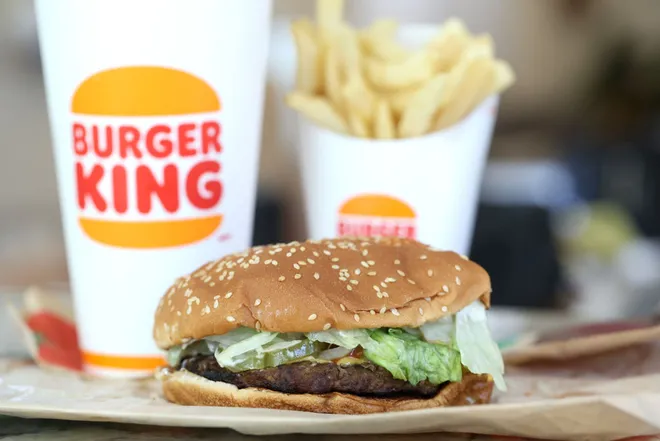
A judge ruled last week that Burger King must face a class action lawsuit accusing the chain of false advertising, joining the ranks of other fast-food giants like McDonald’s, Burger King and Taco Bell.
The latest in a line of similar legal actions, the lawsuit was originally filed in March 2020, alleging that the burger chain falsely inflated the size of their signature Whopper sandwiches in promotional materials.
The suit claims that Burger King made Whoppers appear twice as large as they actually are in advertisements, while the actual burgers served to customers are 35% smaller than those marketed.
“Burger King advertises its burgers as large burgers compared to competitors and containing oversized meat patties and ingredients that overflow over the bun,” said the filing.
“Although the size of the Whopper and the beef patty increased materially in Burger King’s advertisements, the amount of beef or ingredients contained in the actual Whopper that customers receive did not increase,” it continued, accusing Burger King of “materially overstating the size of nearly every menu item in its current advertisements.”
Consumers claim false advertising
The suit was brought by Florida attorney Anthony Russo, representing plaintiffs from Florida, New York, Illinois, Massachusetts, Michigan, California, Connecticut, Ohio, Kentucky, Mississippi, Pennsylvania, and Arizona.
These plaintiffs claim that they were “disappointed” after purchasing Burger King products based on their appearance in photos, only to find they were smaller when actually served. The complainants said they would not have purchased the food items had they know they did not look like the advertised images and allege they were deceived, according to court documents.
Burger King denied these claims and asked for a judge to dismiss the case, saying reasonable consumers have long-since been aware that food is styled in ads to make it appear “as appetizing as possible” and they are not required to serve burgers that look “exactly like the picture.”
“BKC makes very clear how much beef the Whopper contains,” the company said in the filing.
Quoting their own marketing materials, Burger King pointed out that the asterisks which accompanies the claim that their Whopper Sandwich is “1/4 lb* of savory flame-grilled beef” points to a disclaimer clarifying that the weight refer to that of the pre-cooked patty.
“Plaintiffs do not and cannot contend that BKC delivered them less than a quarter pound of beef with any Whopper or Big King,” said Burger King. “They argue, instead, that they ‘expected’ more beef, ostensibly because of the protruding patties in the pictures.”
Judge gives the go-ahead
In a ruling last Wednesday, U.S. District Judge Roy Altman agreed to dismiss the claims that Burger King’s television and online advertisements misled customers, as well as accusations the company violated consumer protection laws.
However, he determined that other components of the lawsuit, alleging negligent misrepresentation, breach of contract and unjust enrichment, could go forward, saying the court is not in the position to determine if the difference between products received and advertised were “enough to alter the purchasing preferences of reasonable American consumers.”
Instead, he said, it’s better “to leave that determination to the consumers themselves, who — if the case survives that far — will get to sit in the jury box and tell us what reasonable people think on the subject.”
A Burger King spokesperson told USA TODAY in a statement following the judgment, “The plaintiffs’ claims are false. The flame-grilled beef patties portrayed in our advertising are the same patties used in the millions of Whopper sandwiches we serve to Guests nationwide.”
The plaintiffs’ attorney, Anthony Russo, did not immediately return request for comment.
Fast food lawsuits
The lawsuit is the latest in a string of recent litigation against chain restaurants over their food.
Last month, a New York man sued Taco Bell for false advertising, claiming their Mexican Pizza only had about “half of the beef and bean filling that he expected.”
In March, a Chicago man sued Buffalo Wild Wings, saying the company’s “boneless wings,” aren’t wings at all, but really just cheaper, chicken breast tenders. Buffalo Wild Wings has denied the allegations and is asking a judge to dismiss the case, saying that the “boneless wings” wouldn’t mislead “reasonable consumers.”
Meanwhile McDonald’s, Burger King and Wendy’s were all sued last year over the size of their cheeseburgers.
























